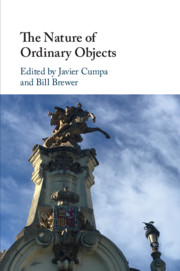Book contents
- The Nature of Ordinary Objects
- The Nature of Ordinary Objects
- Copyright page
- Dedication
- Contents
- Contributors
- Acknowledgements
- Introduction: Issues and Options
- 1 Perception and Ordinary Objects
- 2 Empirical Evidence and the Metaphysics of Ordinary Objects
- 3 Basic Objects As Grounds: A Metaphysical Manifesto
- 4 Objects, Ordinary and Otherwise
- 5 In Defence of Ordinary Objects and a Naturalistic Answer to the Special Composition Question
- 6 Compound Natural Beings: Varieties of Compositional Unity
- 7 How Can Thought Select Between Coincident Material Things?
- 8 Against Analytic Existence Entailments
- 9 Mass Production
- 10 Pragmatism, Ontology and Ordinary Objects
- 11 What Can Global Pragmatists Say About Ordinary Objects?
- 12 There Are No Such Things As Ordinary Objects
- Bibliography
- Index
5 - In Defence of Ordinary Objects and a Naturalistic Answer to the Special Composition Question
Published online by Cambridge University Press: 05 April 2019
- The Nature of Ordinary Objects
- The Nature of Ordinary Objects
- Copyright page
- Dedication
- Contents
- Contributors
- Acknowledgements
- Introduction: Issues and Options
- 1 Perception and Ordinary Objects
- 2 Empirical Evidence and the Metaphysics of Ordinary Objects
- 3 Basic Objects As Grounds: A Metaphysical Manifesto
- 4 Objects, Ordinary and Otherwise
- 5 In Defence of Ordinary Objects and a Naturalistic Answer to the Special Composition Question
- 6 Compound Natural Beings: Varieties of Compositional Unity
- 7 How Can Thought Select Between Coincident Material Things?
- 8 Against Analytic Existence Entailments
- 9 Mass Production
- 10 Pragmatism, Ontology and Ordinary Objects
- 11 What Can Global Pragmatists Say About Ordinary Objects?
- 12 There Are No Such Things As Ordinary Objects
- Bibliography
- Index
Summary
This paper first (Section 1) discusses the meaning of the English expression ‘ordinary’, its vagueness and its context-sensitivity. The diversity of types of ordinary objects is illustrated using data from comparative linguistics. It is then argued that many such objects must exist despite their composite nature (at least at ‘close’ possible worlds) (Section 2). Two arguments are given. The first (Section 2.1) is a charity argument and is roughly that the existence, development and survival of cognitive and linguistic capacities and representations require that, for any human linguistic community c, a ‘large number’ of expressions/concepts purporting to refer to/apply to objects and used by normal, healthy adult thinkers of c must successfully refer/have a non-vacuous extension (at least at ‘close’ possible worlds). The second argument (Section 2.2) is against the van Inwagenian rephrasing strategy for mereological nihilism, and is roughly that it offers only a simulacrum of rephrasing, and that nihilism is incompatible with virtually all current scientific and ‘everyday’ reasoning and knowledge, as well as being epistemologically self-defeating. The next parts of the paper (Sections 3, 4 and 5) explain how ordinary objects can exist given their composite nature by defending a naturalistic answer to the special composition question, according to which, roughly, objects compose something at t iff they form a chain of bound states at t. An appendix (Section 6) illustrates this thesis with examples drawn from classical and quantum physics.
- Type
- Chapter
- Information
- The Nature of Ordinary Objects , pp. 82 - 128Publisher: Cambridge University PressPrint publication year: 2019
- 3
- Cited by



